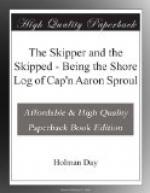“And the best hen takes the money; no flummery, no filigree!” put in Reeves.
Hiram was kneeling beside his agitated bag, and was picking at the knots in its fastening. “This will be a hen-fight served up Smyrna style,” he said, grimly. “And, as near as I can find out, that style is mostly—scrambled!”
“I’ve got a favor to ask,” stammered Wixon, hesitatingly. “It don’t mean much to you, but it means a good deal to others. Bein’ penned up on a poor-farm, with nothin’ except three meals a day to take up your mind, is pretty tough on them as have seen better days. I’ll leave it to Cap’n Sproul, here, if I ain’t tried to put a little kindness and human feelin’ into runnin’ this place, and—”
Hiram was untying the last knot. “Spit out what you’re drivin’ at,” he cried bluntly; “this ain’t no time for sideshow barkin’. The big show is about to begin.”
“I want to invite in the boys,” blurted Wixon. And when they blinked at him amazedly, he said:
“The five old fellers that’s here, I mean. They’re safe and mum, and they’re jest dyin’ for a little entertainment, and it’s only kindness to them that’s unfortunate, if you—”
“What do you think this is, a livin’-picture show got up to amuse a set of droolin’ old paupers?” demanded Hiram, with heat.
“Well, as it is, they suspect suthin’,” persisted Wixon. “All they have to do to pass time is to suspect and projick on what’s goin’ on and what’s goin’ to happen. If you’ll let me bring ’em, I can shet their mouths. If they don’t come in, they’re goin’ to suspect suthin’ worse than what it is—and that’s only human natur’—and not to blame for it.”
The two selectmen protested, official alarm in their faces, but Hiram suddenly took the keeper’s side, after the manner of his impetuous nature, and after he had shrewdly noted that Reeves seemed to be most alarmed.
“I’m the challenger,” he roared. “I’ve got something to say. Bring ’em, Wixon. Let ’em have a taste of fun. I may wind up on the poor-farm myself. Bring ’em in. There’s prob’ly more sportin’ blood in the paupers of this town than in the citizens. Bring ’em in, and let’s have talkin’ done with.”
In a suspiciously short time Wixon led in his charges—five hobbling old men, all chewing tobacco and looking wondrously interested.
“There!” said Hiram, an appreciative glint in his eyes. “Nothin’ like havin’ an audience, even if they did come in on passes. I’ve never given a show before empty benches yet. And now, gents”—the old spirit of the “barker” entered into him—“you are about to behold a moral and elevatin’ exhibition of the wonders of natur’. I have explored the jungles of Palermo, the hills of Peru Corners, the valleys of North Belgrade, never mindin’ time and expense, and I’ve got something that beats the wild boy Tom and his little sister Mary. Without takin’ more of your valuable time, I will now present to your attention”—he tore open the bag—“Cap’n Kidd, the Terror of the Mountains.”




